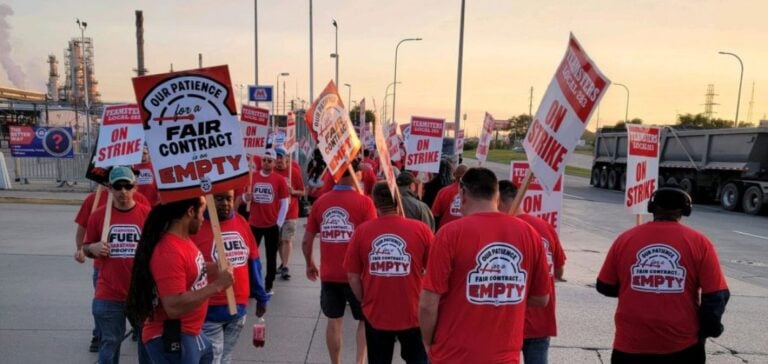Talks between Marathon Petroleum Corporation and the Teamsters have remained deadlocked since the start of the strike at the Detroit refinery, where around 200 workers stopped work on September 4, 2024.
The union denounces a lack of constructive dialogue on the part of the company, and raises the possibility of extending the movement to other refineries.
This situation is raising concerns about the impact on fuel production and the stability of the energy market.
Deadlock on wage and union negotiations
At the heart of the dispute are wage conditions and workplace safety.
The Teamsters, represented by their local president Steve Hicks, are demanding wage increases in excess of the 3% annual increase proposed by Marathon Petroleum, which is deemed insufficient in the face of inflation.
In addition, the workers are demanding guarantees of union security following the annulment of the “Right-to-Work” law in Michigan, which prohibited the compulsory collection of union dues.
Marathon Petroleum management, for its part, is sticking to its guns and has not responded to calls to resume negotiations.
This inertia has fuelled discontent among workers, who are ready to extend the strike to other refineries in the group, potentially including the 102,000-bpd Saint Paul site.
Threat of strike extension and market risks
The idea of extending the strike to other sites is not an empty threat.
Marathon Petroleum owns 13 refineries in the USA, with a total capacity of 2.9 million barrels per day.
Any further disruption could disrupt fuel supply chains, potentially affecting market prices and distribution in several regions.
Recent history shows that prolonged strikes at US refineries have a direct impact on the logistics and availability of petroleum products.
An escalation could therefore weigh on Marathon’s refining margins and financial results, while exacerbating the pressure on the company to find a rapid solution to the labor dispute.
Towards mediation or a prolonged stalemate?
The current situation raises questions about conflict management strategies in the energy sector.
Mediation could help defuse the crisis and restore dialogue.
However, without openness on the part of Marathon Petroleum, the risks of a prolonged stalemate increase.
The Teamsters are making it clear that they are ready to mobilize their members in other refineries to put pressure on management.
The stakes are high, both for Marathon Petroleum and for energy market players.
A rapid resumption of negotiations would be in the interests of all parties to avoid major disruption.
The outcome of this tug-of-war could also influence future union negotiation strategies in the US oil industry.





















